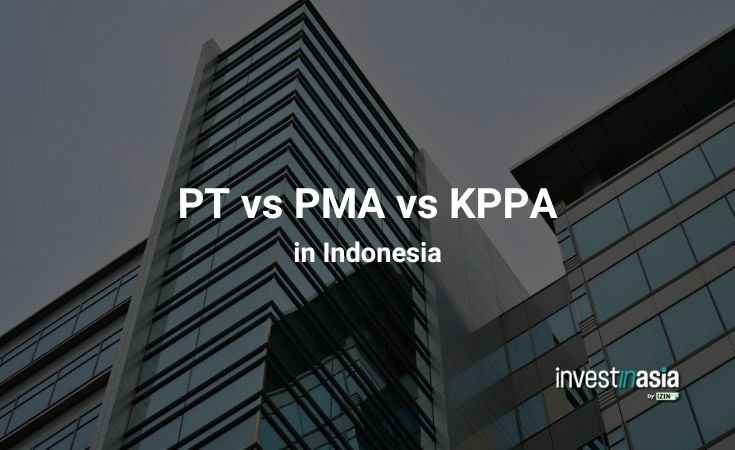Key Takeaways:
- PT, PMA and KPPA in Indonesia represent three core business structures established under Indonesian Company Law and Investment Law.
- PT (Perseroan Terbatas) refers to a locally owned limited liability company, governed by Law No. 40 of 2007, suitable for domestic investors.
- PMA (Penanaman Modal Asing), or Foreign-Owned Company, allows partial or full foreign investment, regulated by the Indonesia Investment Coordinating Board (BKPM) through the Positive Investment List.
- KPPA (Kantor Perwakilan Perusahaan Asing), or Representative Office, enables foreign parent companies to conduct market research, liaison, and preparatory activities without generating income in Indonesia.
Are you aiming at the Indonesian market to expand your foreign investment or business yet still not sure which suitable legal entity you want to set up? Similar to other countries, Indonesia has its various company forms, to begin with. PT vs PMA Indonesia, two of the most widely popular business forms for this purpose, what makes them different?
Interestingly, there is also the so-called Representative Office that enters the discussion and surprisingly can be a helpful bridge in preparing the other two.
Also read: The Types of Companies in Indonesia: Complete Guide
Know The Definition of PT vs PMA vs KPPA
Before knowing the differences, you need to know the definition of each type of company.
PT Company in Indonesia


A Perseroan Terbatas (PT) is the most common business entity type in Indonesia. It is a limited liability company owned entirely by Indonesian citizens or legal entities. PTs can operate in a wide range of sectors, from services and trade to manufacturing, depending on the business license obtained.
Legal Basis
- Governed under Law No. 40 of 2007 on Limited Liability Companies
- Requires at least two local shareholders
- The liability of shareholders is restricted to the amount they have invested in their shares.
Advantages
- 100% local ownership
- Flexible operations across most business fields
- Recognized legal personality under Indonesian law
Documents Required
- Deed of Establishment
- Approval from the Ministry of Law and Human Rights
- Domicile Certificate
- NPWP (Taxpayer Identification Number)
- Business Identification Number (NIB) via OSS system
- Company Registration Certificate (TDP, now integrated into NIB)
Key Consideration
While PT is simpler for local investors, foreign ownership is restricted, meaning international companies often prefer PMA or KPPA structures for initial market entry.
If you want a somewhat simple one, register local PT company to expand or look for a promising spot for your business in Indonesia.
Also read: How to Set Up a PT Company in Indonesia: Guide for Foreigner
PMA Company in Indonesia (Foreign-Owned Company)
A PMA (Penanaman Modal Asing) company is a foreign investment entity that allows partial or full foreign ownership in compliance with Indonesian investment regulations.
Regulatory Authority
Supervised by the Indonesia Investment Coordinating Board (BKPM) and subject to the Positive Investment List, which specifies which sectors are open or restricted for foreign ownership.
Ownership and Structure
- At least two shareholders (individuals or entities)
- Minimum of one director and one commissioner
- Foreign ownership percentage depends on the business sector
Check: Does a PT PMA Company Need Indonesian Shareholders and Employees?
Capital Requirements
The minimum investment plan for PT PMA companies in Indonesia is IDR 10 billion (~USD 650,000).
Advantages
- Enables foreign ownership and international business operations
- Can sponsor foreign employees and import capital goods
- Can engage in commercial transactions and profit-making activities
Ongoing Obligations
- Submit Investment Activity Reports (LKPM) regularly (check: LKPM Reporting for PMA / Foreign Companies in Indonesia)
- File monthly and annual tax reports
- Comply with employment and labor law regulations
Setup a PT PMA company in Indonesia now if you are interested in investing or doing business in this country through simplified processes for affordable offers.
Also read: How to Set Up PMA Company in Indonesia: Guide for Foreigner
Representative Office (KPPA) in Indonesia
A KPPA (Kantor Perwakilan Perusahaan Asing) or Representative Office is a non-commercial entity established by a foreign company in Indonesia.
It serves as a liaison or coordination office, facilitating communication, market analysis, and preparation for future investment.
Purpose and Limitations
- Cannot issue invoices or sign contracts for commercial activities
- Cannot generate income within Indonesia
- Functions include market research, promotion, and parent-company support
Required Permits and Documents
- Application to BKPM for Representative Office License
- Articles of Association of the parent company
- Appointment Letter for Chief Representative
- Valid passport or ID of Chief Representative
- Lease Agreement for office space
- Local contact details and Letter of Intent
Advantages
- Fast and low-cost setup
- Ideal for testing the Indonesian market
- Can evolve into a PMA company once the business is ready for investment (check our guide here: How to Transition from a Representative Office to a PT PMA in Indonesia: InvestinAsia’s Guide)
If setting up a PMA is your near-future plan, have your professional representative office in Indonesia first and conduct your market research before coming to this country.
Also read: 7 Reasons and Advantages for Starting a Business in Indonesia
Key Differences: PT vs PMA vs KPPA in Indonesia
Here are eight key differences between PT, PMA, and KPPA:
| Criteria | PT (Local Company) | PMA (Foreign-Owned) | KPPA (Representative Office) |
|---|---|---|---|
| Ownership | 100% Indonesian | Up to 100% foreign (sector-dependent) | 100% foreign (parent company) |
| Legal Basis | Law No. 40/2007 | Investment Law & BKPM Regulations | BKPM Guidelines |
| Capital Requirement | Based on business field | Min. IDR 10 billion investment | No capital requirement |
| Activities Allowed | Commercial & operational | Commercial & operational | Non-commercial only |
| Tax Obligations | Corporate income tax | Same as PT | Limited, based on expenses |
| Employment | Local employees | Local & foreign employees | Appointed representative |
| Setup Duration | 2–4 weeks | 4–6 weeks | 1–2 weeks |
| Best For | Local entrepreneurs | Foreign investors | Market entry preparation |
Choosing the Right Entity for Your Investment
Based on the above explanation, we can conclude that:
- Choose PT if you are an Indonesian citizen or entity focusing on domestic operations.
- Choose PMA if you are a foreign investor aiming for ownership control and long-term operations.
- Choose KPPA if you want to study the market, establish presence, or prepare for future expansion into a PMA.
The right choice depends on your investment goals, industry classification, and regulatory requirements outlined by BKPM and the Positive Investment List.
That sums up the discussion of PT vs PMA Indonesia, not to mention how different they are from KPPA company. Each requires different requirements for the establishment that also lead to rights and responsibilities similarly applied to other local companies.
Professional assistance – guidance and support – can be your first helpful step to a smoother process. You can chat us now and get FREE consultation!





